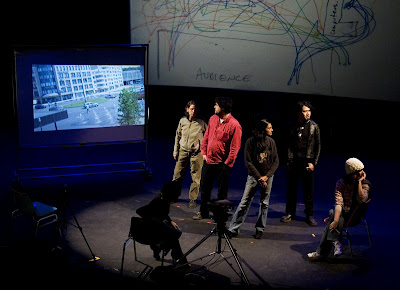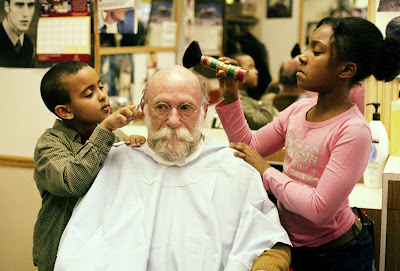 Photo by Lisa Kannakko.
Photo by Lisa Kannakko.1) What the fuck is going on?
Mammalian is going through a rapid transition and expansion. We started working with new producer Natalie De Vito last August and the way the company functions is evolving.
Rather than producing discreet shows, where we bring a team together to work on something for a finite period of time, we’re now conceiving the company as an atelier and working more like a design firm, with a range of projects at different stages of readiness, some projects finished and ready to tour, some still in development and almost all of them available for the company to cannibalize, with components swapped in or out, scale adjusted, production elements added or reduced, participants tweaked or thoroughly recast, etc.
I think of the company as the main project; Mammalian Diving Reflex is the show, all the smaller units are ours acts, as in circus acts.
The projects have different leaders on them, people who can travel with them so that we can be creating work on a variety of continents at the same time. We have a Vancouver-based project producer, Hazel Venzon – who produced Haircuts by Children in Italy – a Montreal project producer, Zoë Stronyk and our collaborators – Rebecca Picherack and Stephanie Comilang in Toronto who also lead projects.
The size of the institutions we’re starting to collaborate with are becoming larger and Europeans are starting to commission new work especially for their locale.
We’ve become the Art Company in Residence at Parkdale Public School and we’re piloting a project this spring, Parkdale Public School vs. Queen West, which we’re hoping to make permanent.
Parkdale PS is where we developed some of our most successful stuff – like Haircuts by Children and The Children’s Choice Awards – and we want to continue that relationship. Part of the problem with touring is that you lose touch with your home, especially if, like me, you’re single and childless. Making a long-term creative commitment to 700 kids in my neighborhood gives me and the company a really nice goal that is relatively detached from all the careerist and usually tedious thoughts that always bubble in my head. While still, ironically, producing some of our best work.
 Diplomatic Immunities. Photo by John Lauener.
Diplomatic Immunities. Photo by John Lauener.2) How have you developed as an Artistic Director since founding Mammalian Diving Reflex in 1993?
A lot of stuff has changed. I started with scripts that I wrote and directed, then I started to share the directorial and dramaturgical responsibility with Rebecca Picherack (who you really should interview), sometimes leaving all the directing up to her, sometimes not. Now we don’t direct the shows, we coordinate various aspects – we even credit ourselves as coordinators not directors.
In 2003 we started the Social Acupuncture wing of the company, where we create more interventionist participatory work and the demand for that work has exploded, particularly from overseas and in the visual art world.
The work we do with kids, which started before Haircuts by Children has also been a big change, and really informs our process. I think it’s important to understand that the choice to work with kids was certainly artistic but it was also – in no small part – a business decision. Good work created in collaboration with children is rare and very much in demand.
The biggest change has been in the way the company as an entity functions and is conceived. The artistry happens in the realm of production. Rarely are we in a rehearsal hall, shielded from the tedium of the minutia of producing the work, that minutia – all the logistics in developing a work – is the work, making it much less tedious. Like I said, I think of the company as the show, as the art.
3) What is “ideal entertainment for the end of the world”?
It’s just a funny tagline for the company. We want to be clear that we are creating entertainment and that we believe the world (as we know it) is coming to an end.
 Haircuts by Children. Photo by John Lauener.
Haircuts by Children. Photo by John Lauener.4) What is neoliberalism and what are its shortcomings?
That question is best answered by an expert like David Harvey, I would be just regurgitating the stuff I’ve read by him and others.
Harvey’s A Brief History of Neoliberalism is good.
Here’s an interview with him.
5) How interested are you in helping other artists make civic engagement central to their work?
Very.
6) How much of your work is informed by a sense of anger?
All. But informed by other stuff too like joy, hilarity, play, love, surprise, etc.
 Photo by Lisa Kannakko.
Photo by Lisa Kannakko. 7) What is your case for optimism?
I’m not optimistic. I think we’re in terrible times and it’s only going to get worse.
8) How do you feel about the idea that Canadian artists, generally, are stuck in an identity politics paradigm – an obsession that prevents us from dealing concretely with issues such as war and governance in our work?
Identity politics inform so little of the work I see. There’s a small percentage of the work that is informed almost entirely by identity politics, but it’s really in the minority. And it’s usually those artists who are the most interested and skilled at dealing with questions like war and governance.
9) What are some of the questions that are on your mind these days?
Most of my concerns these days are about running the company during our growth spurt and how to balance all the demands, what to turn down, what to take on, etc.
The atelier model we’re adopting is very interesting to me, I like having projects that can be dismantled, bits of which are used on new projects, stuff expanded and contracted as need be.
I’m very excited by the potential of passing responsibility to project leaders who can work independently and, eventually, begin to develop their own projects.
10) If you could change just one thing about theatre in Toronto, what would it be?
Theatre in Toronto is perfect.
cool interview.
we’re learning here at Praxis (sometimes the hard way) that your organizational structure has an immediate impact on on how and what you create. maybe even why. having different project leaders for separate initiatives is something we’re really pushing.
Laura Nordin runs our reading series, Shaun McComb is organizes our internal training workshops, and Ian Mackenzie runs this very blog. bringing people together for 6 weeks to work on a project whenever you have a successful grant application doesn’t seem like a strong choice in creating a cohesive dynamic company.
anyone else reading along with a theatre company want to throw out how they like to/want to operate? or don’t have a theatre company but have some ideas about how it should be run if they had one?
btw. Darren, i just finished working on a show with Rebecca and had already filed her away to suggest to Ian for a future interview….
okay, there’s no way for me to post this with out admitting that despite my english degree, i had to google “atelier”. which is how i found this link for atelier toronto:
http://www.ateliertoronto.com/
it’s funny mainly because it’s the opposite of Mammalian Diving Reflex. the song is also this tune they had on repeat at a fancy place i used to bartend at where drinks we’re $14-$20 a pop. it’s like the theme song for conspicuous consumption.
haha, that Atelier site is funny. Apparently you can’t buy your way in, you have to convince them via email that you’re cool enough. I wonder if there’s a secondary screening, or is that it? great email, you’re in, have some chocolate.